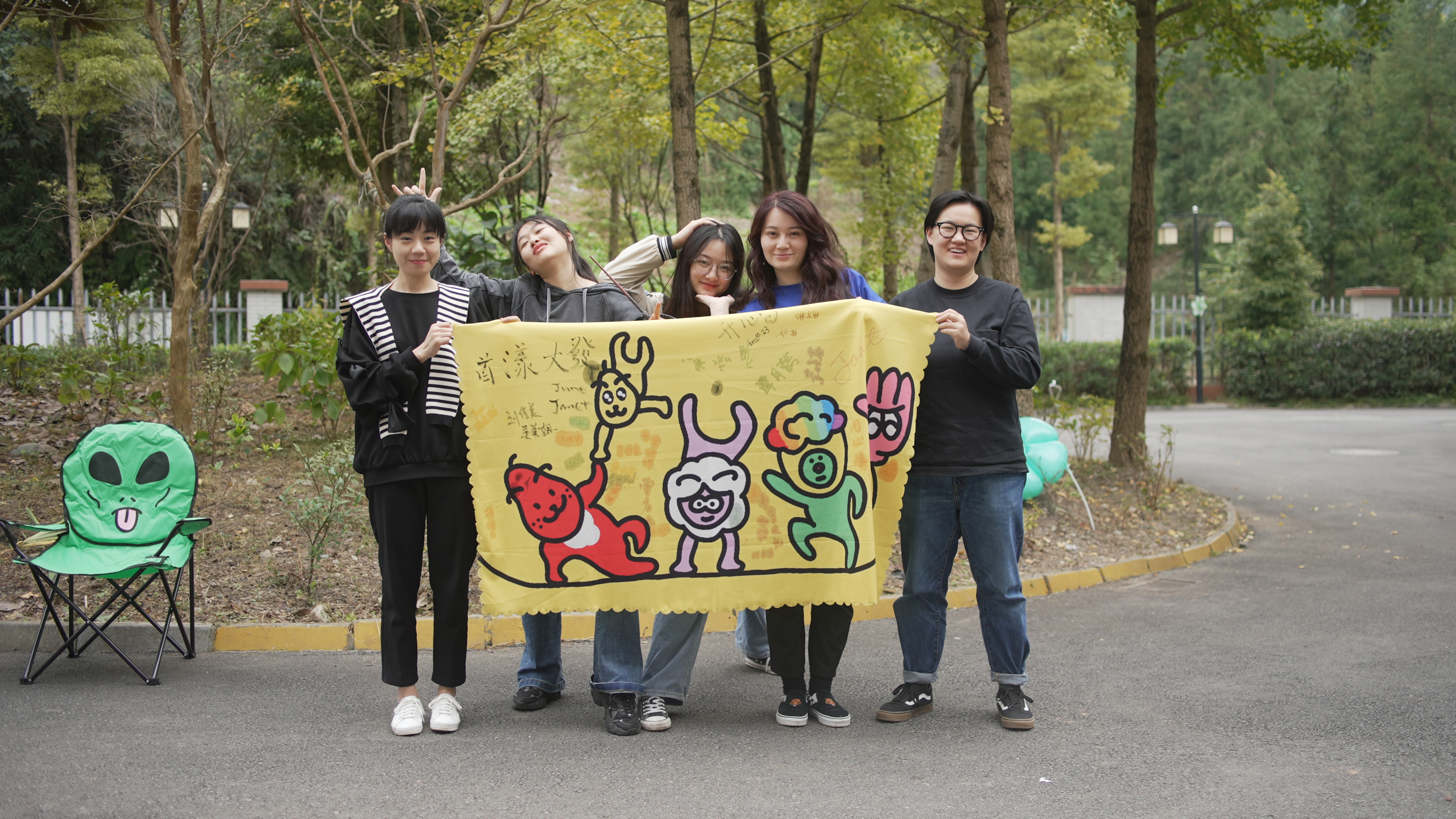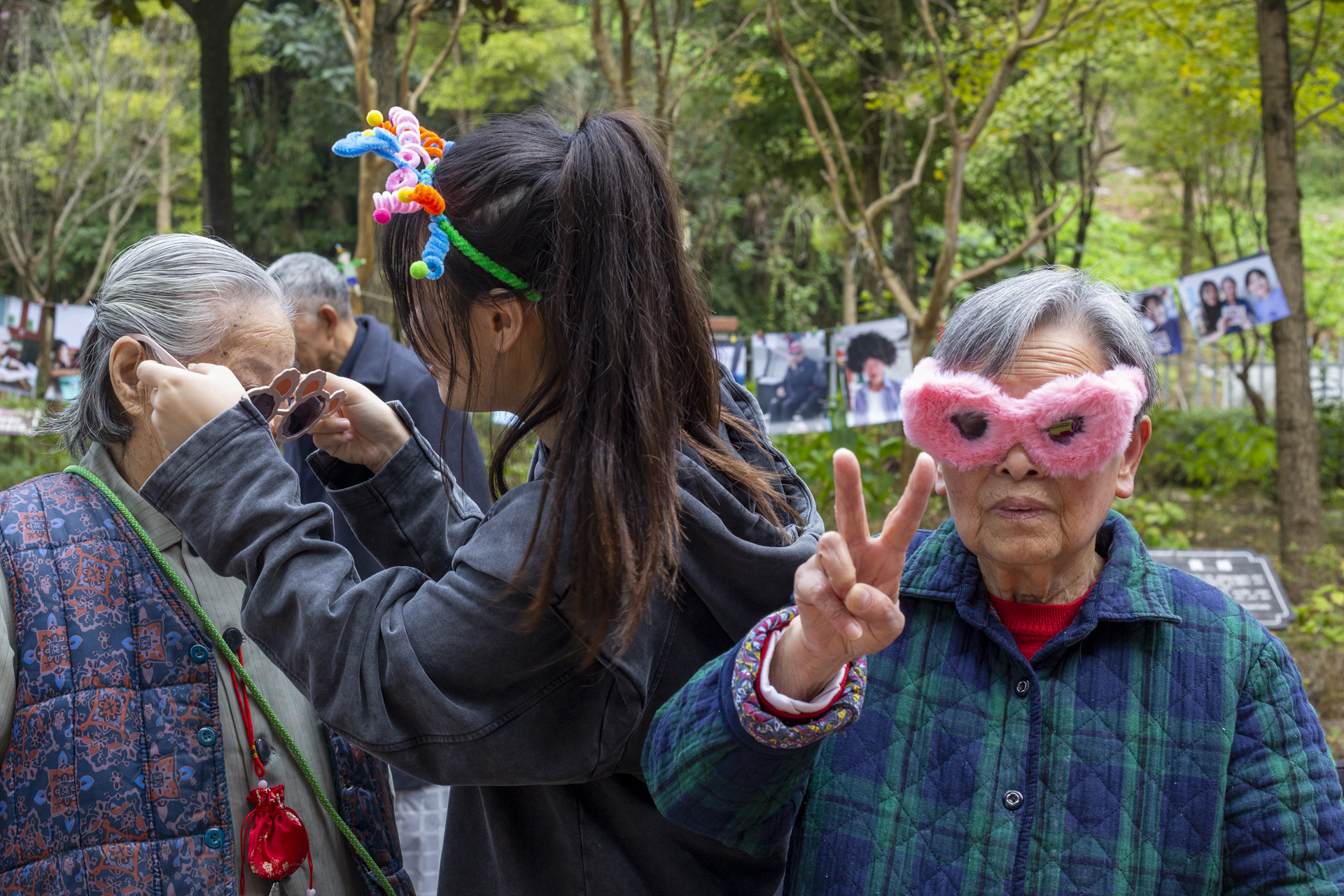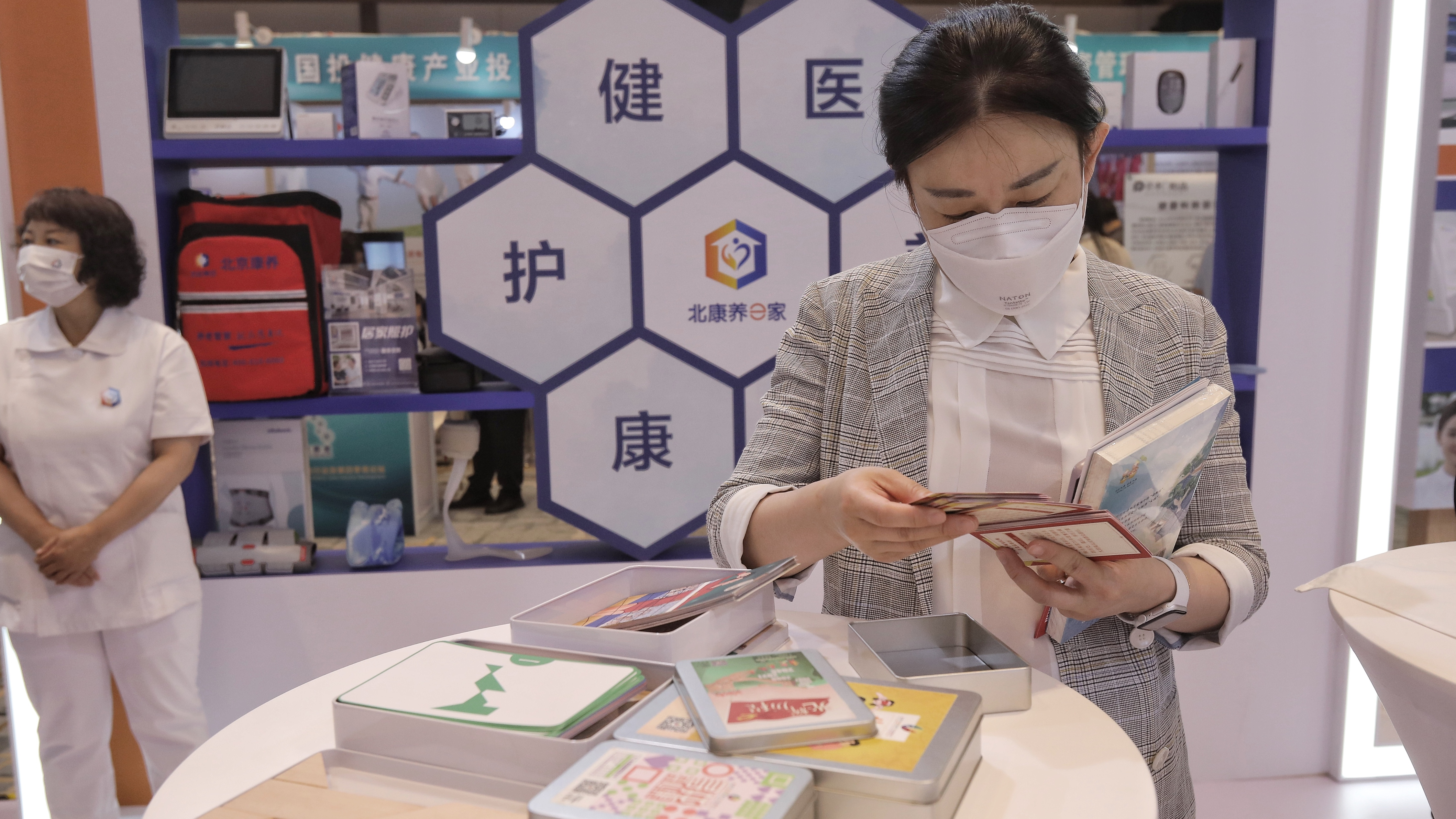
Zhou Hang (2nd Right) and her young team show IP images of their cultural products in Ya'an, southwest China's Sichuan Province, October 27, 2022. /Courtesy of Zhou Hang
Zhou Hang (2nd Right) and her young team show IP images of their cultural products in Ya'an, southwest China's Sichuan Province, October 27, 2022. /Courtesy of Zhou Hang
In the past five years, Zhou Hang's nursing home has tried several new things that traditional elderly care institutions in China rarely consider.
From fashion shoots and making short videos to camping and exhibitions, Zhou's team unleashed their imagination in connecting the elderly with the vibrant world outside the care home's compound. Its name, So Young, also gives a clue that it's a bit different.
"No one wants to be 'locked up' in a building, no matter how upscale, luxurious, or convenient the supporting facilities are. People are social animals, and we always need to have a strong connection with the outside world," said Zhou, 31, who established the company with a like-minded partner in 2018.
Based in Ya'an, southwest China's Sichuan Province, So Young provides common elderly care services like other nursing homes. But the startup wants to empower the senior care industry by attracting the participation of young people. The company designs and sells cultural products and services that they created based on the theme of elderly care. Through short videos posted on social media platforms, they have shown the pleasure and surprises of inter-generational communication.
Currently, it has a 10-member team responsible for design, media operation, community building and other positions. Most of them are in their 20s.
"They are attracted mainly by three factors: vitality, innovation, and co-creation," said Zhou, adding that her company cherishes young people's creativity, respects their creative work and provides chances for learning.
As Zhou and her team explore new possibilities of elderly care, they noticed a common dilemma facing the industry - few young people stay for long. Main reasons behind include low salary, social prejudice against nursing workers, and frustration caused by actual working environment.

A fashion shoot for the elderly organized by So Young in Ya'an, Sichuan Province, October 26, 2022. /Courtesy of Zhou Hang
A fashion shoot for the elderly organized by So Young in Ya'an, Sichuan Province, October 26, 2022. /Courtesy of Zhou Hang
Rising demand
Today, one in seven Chinese is over 65. As the elderly population in China continues to grow, more professional caregivers are needed in the labor market.
According to data from local life service platform Meituan, elderly care services provided by patient escort and bath assistant are surging in recent years. Compared with the same period last year, orders of bath assisting services and patient accompanying services increased by 442 percent and 729 percent, respectively. The top three places in terms of search volume are Beijing, Shanghai and Sichuan.
"Ideally speaking, the elderly care industry has great potential to provide jobs because of the large scale and high demand of senior care in our country," said Professor Chen Gong, director of the Institute of Population Research at Peking University.
But he pointed out that China's elderly care industry is still in its infancy and there's no real appeal to young people when the industry mainly provides low-end positions.
From medicine, health care to insurance and spiritual needs, Chen said, the industry needs young people who truly understand aging, design and market, and are willing to continually innovate and practice, especially in providing the middle- and high-end products and services.
"It is necessary to let young people find space for their career development in the elderly care industry," said Chen, adding that policies are needed to support innovation and transformation from ideas to products.
"Seniors are users of elderly care services and products, and young people are the designers, actual buyers and promoters in the market," said Chen. "A healthy and sustainable elderly care industry needs participation of both the old and young."

A woman looks at a display of intelligence toys for the elderly at an elderly care service industry development forum in Beijing, May 24, 2023. /CFP
A woman looks at a display of intelligence toys for the elderly at an elderly care service industry development forum in Beijing, May 24, 2023. /CFP
Meeting the demand
Wang Yifan, a fresh graduate majoring in nursing care, recently kick-started her career in a senior care institution in Zhengzhou, the capital city of central China's Henan Province. Wang takes care of the health of over 20 elderly people at the institution where she has worked as an intern for a year and a half. This summer, the nursing institution also welcomed 24 more new graduates like Wang.
"I think the training model is very good. We can experience the practical working environment earlier, and have a better understanding of our major," said Wang.
The order-oriented talent training model she refers to has been promoted by the Ministry of Civil Affairs and the Ministry of Education in recent years. Enterprises place talent orders in colleges and college students can get familiar with their future jobs in advance. In Wang's case, she spends three semesters in a care institution after learning theoretical knowledge at school for three semesters.
This year, colleges found that graduates of elderly care related majors are soon snapped up in the labor market. East China's Shandong Province has the country's largest enrollment of elderly care majors. In 2023, more than 4,000 graduates enter the labor market. But it is still far from meeting the demand.
In June, the civil affairs department of Shandong held a job fair for fresh graduates of senior care majors in the city of Liaocheng. Wei Congcong, a recruiter from a local senior care institution, said she wanted to hire some young, highly-educated talents in the fair, admitting that their current staff members are in need of professional knowledge.
In order to attract more young people to engage in the elderly care industry, many provinces and cities have recently introduced supportive policies.
Shandong gives a one-time entry bonus of 10,000 to 20,000 yuan (about $1,390 to $2,780) to every graduate who chooses to work in a senior care institution. In north China's Shanxi Province, the one-time incentive reaches 30,000 to 60,000 yuan for those who started working in the elderly care industry this July.

A job fair for fresh graduates of senior care majors is held in the city of Liaocheng, east China's Shandong Province, June 20, 2023. /CMG
A job fair for fresh graduates of senior care majors is held in the city of Liaocheng, east China's Shandong Province, June 20, 2023. /CMG